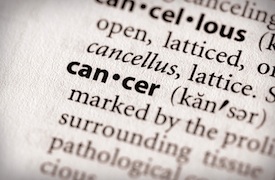
Colon cancer occurs when cancerous cells grow within the large intestine. The condition is also called colorectal cancer when it affects the rectum, or the last portion of the colon. Colon cancer occurs when cells begin growing out of control and spreading into the wall of the large intestine. Depending on how many cells are growing in the area or where they have spread, colon cancer may need to be treated with surgery, medications or both.
Colon cancer may initially develop through polyps, which are growths on the interior lining of the large intestine. Polyps are groups of cells that are considered pre-cancerous, meaning they have the potential to turn into cancerous cells. Polyps may grow, undetected, within the large intestine, causing few symptoms. For this reason, doctors recommend that everyone over the age of 50 receive regular screenings for colon cancer to rule out the presence of excess cell growth.
Initial symptoms of colon cancer include abdominal pain, rectal bleeding, fatigue and weight loss. Additionally, a person may complain of changes in bowel habits, such as consistent diarrhea or constipation. Most cases of colon cancer occur in people who are over 50. Other risk factors include African American race, smoking, obesity, or a history of gastrointestinal diseases, including Crohn's disease.
Colon cancer is treated depending on how much it has spread. Doctors may initially stage colon cancer according to the types of cells they find and if the cells are in other parts of the body, such as in the lymph nodes. This type of cancer is staged between Stage 0, meaning the cancerous cells remain in the lining of the colon to Stage 4, where the cancer has spread to other organs.
If the cancer is within the early stages, it may be treated by surgically removing affected portions of the colon. Cancerous cells that have spread to other areas may require surgery and chemotherapy or radiation. Some of the best prevention for colon cancer is regular screenings for polyps and monitoring for symptoms. Patients may also make healthy lifestyle choices, such as quitting smoking, moderating alcohol intake and eating diets that are high in fiber and low in fat, to reduce their overall risks of developing this serious illness.
What else can I help you with?
what colon cancer simptoms are?
WHAT COLON CANCER SIMPTOMS ARE?
What is sigmoid cancer?
its cancer in the colon. sigmoid is part of the colon.
What are the 2 major diseases of they digestive system what do they do?
Colon cancer- cancer in the colon Tongue cancer- cancer on the tongue
is green stool a symtom of colon cancer?
is green stool a symptom of colon cancer
Why are polyps in one's colon unhealthy?
Polyps in a person's colon are unhealthy because they can be a precursor to colon cancer. Colon cancer is very deadly and considered the second most deadly cancer.
What does colon cancer target in the body?
Colon cancer targets larger intestine and last part of the colon known as rectum, If metastasized colon cancer can also affect liver and lungs.
What stage colon cancer did Sharon Osbourne have?
She was diagnosed with Colon Cancer.
What is the scientific name of the disease colon caner?
I think you mean colon cancer, but there isn't really a scientific name for it colon cancer is short for colorectal cancer.
Is there any treatment for colon cancer?
There are treatments out there for colon cancer but researchers have yet to come out with a full cure for colon cancer yet. It will be done soon though.
Which body systems does colon cancer affect?
The colon cancer affect the digestive system.
What are the specific blood tests for colon cancer?
A CEA is a tumor marker for colon cancer
do colon cancer call vagina to get small?
do colon cancer call vagina to get small
